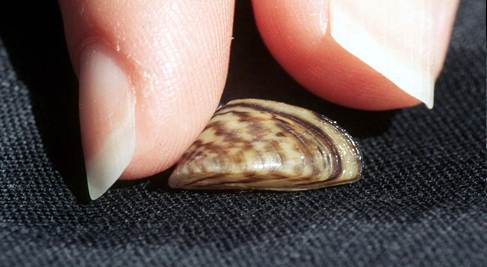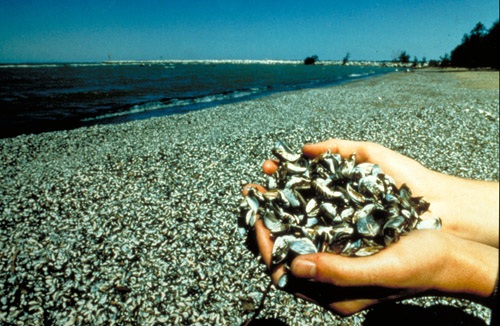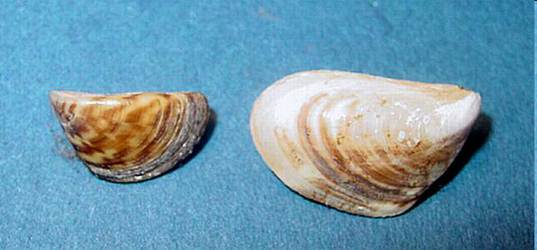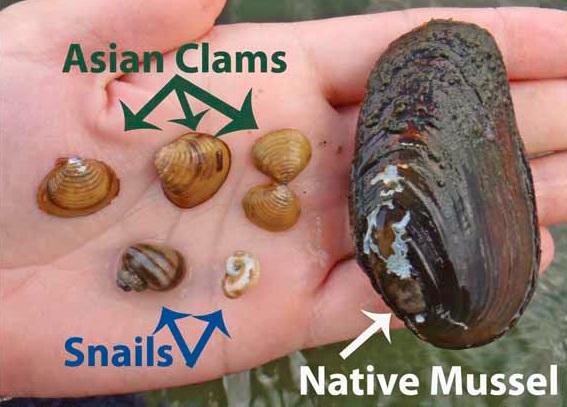Zebra mussels
 Zebra mussels are non-native bivalves that infest and alter fresh water ecosystems. They disrupt the food chain and ecological balance of a waterbody, and interfere with fishing, boating, beach use, and water intakes. Zebra mussels first arrived in the US in the Great Lakes. They have rapidly spread down the Mississippi, out to the West Coast, across the Erie Canal and down the Hudson River. While zebra mussels are also found in Connecticut, so far we have not found them in our lakes.
Zebra mussels are non-native bivalves that infest and alter fresh water ecosystems. They disrupt the food chain and ecological balance of a waterbody, and interfere with fishing, boating, beach use, and water intakes. Zebra mussels first arrived in the US in the Great Lakes. They have rapidly spread down the Mississippi, out to the West Coast, across the Erie Canal and down the Hudson River. While zebra mussels are also found in Connecticut, so far we have not found them in our lakes.
 The growth rate of populations of zebra mussels is so high that it’s difficult to imagine. In the Hudson River, they spread throughout the freshwater portion of the river, with a biomass that exceeded any other heterotroph, within 17 months of first being discovered in the river. The picture on the right is of zebra mussel shells on the shore of Lake Erie.
The growth rate of populations of zebra mussels is so high that it’s difficult to imagine. In the Hudson River, they spread throughout the freshwater portion of the river, with a biomass that exceeded any other heterotroph, within 17 months of first being discovered in the river. The picture on the right is of zebra mussel shells on the shore of Lake Erie.
Another reason to keep zebra mussels out – as if we need another – is that in our experience in New York lakes, harmful algal blooms are more apt to occur in lakes with zebra mussels than in lakes without them. Indeed, a review of statewide DEC data showed that every lake that has a zebra mussel infestation also has harmful algal blooms.
Quagga mussels
Quagga mussels are another small invasive mussel, similar to zebra mussels in their origin and impact. One difference is that zebra mussels choose to attach to a hard substrate like rocks, piers, engine intakes, and pipes. Quagga mussels can tolerate and may prefer mucky bottoms.
We once hoped that only lakes with high levels of calcium would support populations of zebra and quagga mussels, but the mussels seem to be appearing in lakes with lower levels of calcium. Our lakes have adequate levels of calcium to support these mussels, so we need to stay alert.
Asian clams
Another small mollusk is threatening freshwater systems. Asian clams have now been found in many area lakes and in the Hudson River. Thanks to the folks in the Lake Champlain Basin for sharing this helpful photograph which helps compare the size of our native mussel with these invaders.
Chinese mystery snails
Yet another invasive mollusk is found in nearby in the Hudson River and in Timber Lake in Goldens Bridge. These large snails, which can be as large as 2” long, prefer lakes with muddy or soft bottom substrates. Chinese mystery snails will affect the ecology of the lake and their numbers on shoreline can interfere with recreational use of the lakes. The original source was most likely aquarium releases.
Native mussels
Don’t be surprised to find native mussels in our lakes. As seen in the photo above, native mussels are larger than the common invasive clams and mussels, generally about 3″ long, and usually dark in color with some mottled areas. Survival of our native mussels is threatened by all of these invasive mollusks.
What lake users can do
Our fear of zebra mussels and their ecological and recreational impacts drove the original decision to issue Three Lakes Council boat stickers and to try to keep transient boats out of the lakes. If you visit other lakes or rivers, be sure to clean your boat, fishing gear, swim suits, and water toys before you take any of them into our lakes.
If you find a strange looking mussel, clam, or large snail, please take a photo and email it, with a description of the location and what you’ve found, to threelakescouncil@gmail.com and we will try to figure out if it’s a threat to the lakes!
Lake users can help monitor for zebra and quagga mussels and Asian clams. If your dock is over at least 6 feet of water, attach a block or a brick to a rope, and hang it under your dock so that it is about 5 feet deep, and at least 1 foot above the bottom. Then just pull the block up once a month and see if there is anything strange growing on it. If there is, contact us. You can find more information by clicking for the description sheet on “blocking zebra mussels”. Thanks for your help.
Remember: Don’t move a mussel!

